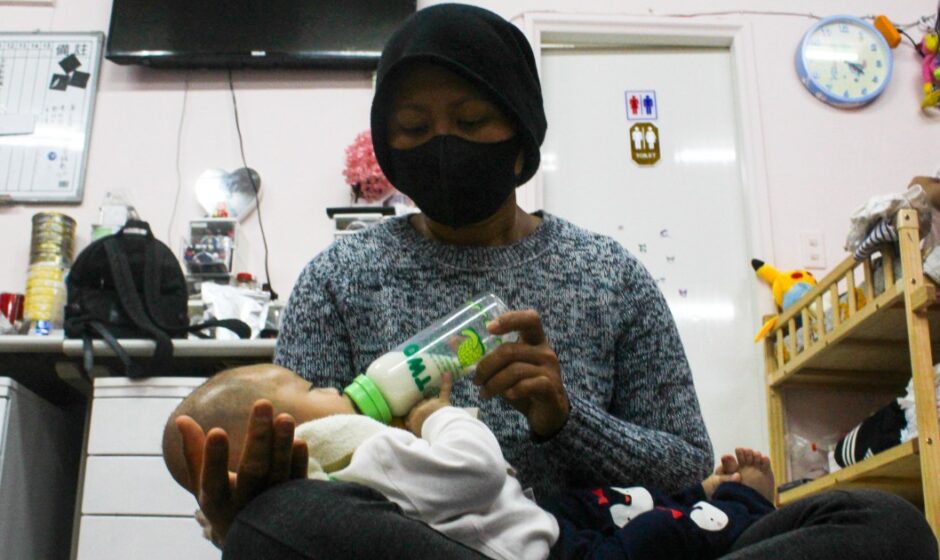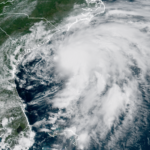This story was produced in partnership with the Pulitzer Center.
Taichung City, Taiwan – Bernard keeps a low profile.
Heading to work on the streets of Taiwan, the 45-year-old Filipino migrant worker dodges glances and often checks his face mask to make sure his appearance is concealed.
To hide his accent, he often speaks in a near-whisper.
Often, he declines invitations to social occasions from his fellow countrymen, worried that a “Judas” among them might report him to the authorities.
Hired at one of Taiwan’s many electronics factories, Bernard came to the island legally in 2016.
But since June 2024, he has been among Taiwan’s growing population of undocumented workers. He blames his broker, a private employment agent to which migrants are usually assigned, for his current predicament.
Bernard’s broker tried to confiscate his passport, he said, then tried to convince him to resign and forgo severance payments from his employer.
He refused both times, he said, causing a rift between them.
“They [brokers] only speak to you when they come to collect payments or when they want to trick you,” Bernard, who asked to use a pseudonym out of fear of repercussions, told Al Jazeera.
Brokers in Taiwan take a cut of their clients’ wages and have significant influence over their conditions and job prospects, making their relationships prone to abuse.
When Bernard’s contract expired in 2022, he said, his broker blacklisted him among other employers.
Desperate to support his daughter’s education in the Philippines, Bernard ditched his broker and decided to overstay his visa to work odd construction jobs, he said.
These days, he said, he feels “like a bird in a cage”.
In public, Bernard would not even utter the word “undocumented” in any language, only gesturing with his hands that he ran away.
![Joy Tajonera celebrates Sunday Mass at Taichung Catholic Church in Taichung, Taiwan, on May 23, 2025 [ Michael Beltran/Al Jazeera]](https://www.aljazeera.com/wp-content/uploads/2025/07/Father-Joy-Tajonera-holding-sunday-mass-1751871878.jpg?w=770&resize=770%2C513&quality=80)
Taiwan’s undocumented workforce is rising fast.
The number of unaccounted-for migrants on the island has doubled in the last four years, reaching 90,000 this January, according to the Ministry of Labor.
Despite Taiwan’s image as one of the region’s rare liberal democracies, a growing number of Southeast Asian migrant workers are living under the constant threat of deportation and without access to social services.
Taiwan institutionalised its broker system in 1992 in a bid to streamline labour recruitment.
Brokers influence almost every aspect of a migrant worker’s life, from where they live, to their meals, to the terms of their employment contracts, and even how they access public services.
Migrant rights advocates say it is precisely this level of control that is prompting large numbers of workers to flee their workplaces.
Over a third of all complaints made by migrants to the Ministry of Labor are broker-related, according to official data.
As of January 2025, Vietnamese made up the biggest share of the undocumented at 57,611, followed by Indonesians at 28,363, and Filipinos at 2,750.
Joy Tajonera, a Catholic priest who runs the Ugnayan Center, a migrant shelter in Taichung City, said the Taiwanese government has taken a lax approach to the issue.
“The system allows the brokers a power to be used to the disadvantage of migrants,” Tajonera told Al Jazeera.
“Meanwhile, employers play innocent.”
Brokers typically charge migrants a monthly service fee of $50 to $60, and also collect fees for job transfers, hospital insurance, leave, and most of the necessary documentation to work in Taiwan.
In some cases, they impose age limits for certain jobs.
Tajonera said many undocumented workers can actually earn more without a broker, “but then you lose all social protections and health insurance. It’s not that they want to run away. It’s their situation, they can’t take it any more.”
‘Shameless and stupid’
Taiwan’s Labor Ministry said in a statement that the increase in undocumented migrants was driven by pandemic-related disruption to deportations.
It said it has taken various steps to improve conditions for migrant works, including raising the minimum wage, conducting regular inspections of recruitment agencies, introducing a new suspension mechanism for agencies with high rates of absconding workers, and encouraging labour-sending countries to reduce agency fees.
“Through pre-employment orientation for industrial migrant workers and one-stop orientation sessions for household caregivers, the ministry aims to enhance workers’ awareness of legal requirements, inform them of the risks and consequences of going missing, and ensure employers fulfill their management responsibilities,” the ministry said.
However, since last year, the Taiwanese government has also increased the maximum fines for migrants caught overstaying their visas from $330 to $1,657.
Lennon Ying-Da Wang, director of the public migrant shelter Serve the People Association, called the government’s move to increase penalties “shameless and stupid”.
“Instead of addressing the reasons for running away, this will just prevent people from surrendering,” he told Al Jazeera.
Wang said a lack of protections, particularly for those working in childcare and fisheries, is the key reason why many migrants abscond from their workplaces.
Neither industry is subject to Taiwan’s monthly minimum wage of $944, according to Taiwan’s Labor Standards Act.
Wang said migrants in practice often receive half that amount minus deductions by brokers.
“Migrants just want a decent salary,” Wang said. “But there’s an unspoken rule among some brokers not to hire migrant workers who ask for help from shelters. That forces them to run away.”
Despite his sympathies, Wang, as the director of a state-funded facility, is not allowed to take in migrants who have absconded from their employers as they are subject to deportation.

On a quiet, nondescript road at the edge of Taipei lies Harmony Home, an NGO catering to undocumented young mothers and children.
While the women and children who stay at Harmony Home cannot be deported for humanitarian reasons, the state is not obligated to shoulder the costs of their care or medical needs.
Harmony Home, which has taken in more than 1,600 children over the past two decades, has recently seen a sharp uptick in minors coming through its doors, founder Nicole Yang said.
“Last year, we had about 110 new kids. By April this year, we’ve already got 140,” Yang told Al Jazeera.
“We also care for 300 others who live at home while their mother works.”
Li-Chuan Liuhuang, a labour expert at National Chung Cheng University, said that while the broker system will be difficult to “uproot immediately”, the government could improve oversight by “making the recruitment procedure and cost structure more transparent”.
In Lishan, a mountainous area of Taichung, hundreds of undocumented Southeast Asians pick peaches, pears and cabbages for local landowners. The presence of runaway migrants, many of whom fled fishing trawlers, is not only tolerated but relied upon for the harvest.
Liuhuang said she would like to see such migrants being allowed to work on farms with proper labour protections, but she believes this would not be easy for the public to accept.
“The government will have to commit more efforts for this kind of dialogue,” she told Al Jazeera.
Mary, who asked to use a pseudonym, said she absconded from her job as a childcare worker to work illegally at various mountain farms after becoming frustrated at earning less than half the minimum wage and having her grievances ignored by her broker.

Sitting beside a cabbage patch, Mary, 46, said she always felt anxious around the police in the city.
But in Lishan the rules are different, she said, as landowners have an unwritten agreement with the authorities about the runaways.
“There’s no way the boss doesn’t have connections with the police. He always knows when they come and tells us not to go out,” she told Al Jazeera.
Even so, there is no guarantee of avoiding mistreatment in the mountains.
After the harvest, employers sometimes withhold payments, threatening anyone who complains with deportation, Mary said.
“If I complain that the boss doesn’t give me the salary, I will get reported. Who will help me?” she said.
#Taiwan #migrants #flee #oppressive #workplaces #life #periphery #Migration #News


